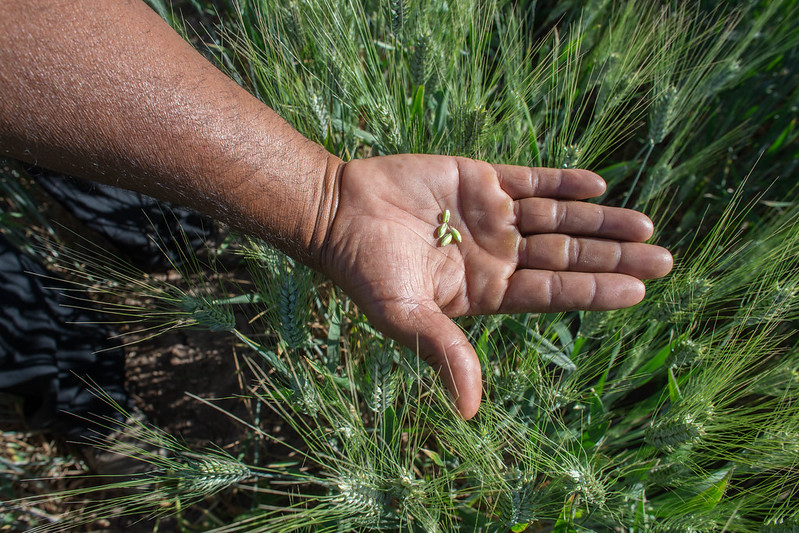CIMMYT and the U.K. have enjoyed a long partnership which has proved valuable for U.K. farmers, exporters and consumers. “CIMMYT investments have delivered substantial economic benefits for the U.K. while reducing global poverty and food insecurity,” said CIMMYT Director General Bram Govaerts. “As the world faces the adverse effects of climate change, CIMMYT investments will continue benefiting the U.K. as the CIMMYT’s supply of climate adapted varieties has increased over time.”
Farmers
Approximately 65 percent of wheat grown in the U.K. can be traced back to CIMMYT breeding material. These varieties contain important genetic characteristics such as dwarfing, which significantly reduces plant height, leading to improved lodging resistance and increased yield, and resistance to wheat rusts and other pest and disease threats. These benefits enable U.K. farmers to produce an additional 800,000 tons of wheat per year, generating over GPB 9 billion in increased profitability since 1971, with additional benefits accruing from the prevention of losses to pests and diseases.
Research
Recognizing the interconnected challenges of global food security and climate change to food security, the UK government and the CGIAR in 2023 created the UK-CGIAR Centre to improve collaboration between CGIAR, the world’s largest global agricultural innovation network, and innovative UK science.
CIMMYT has led this collaboration by partnering with U.K. research organizations and universities, developing a range of tools and technologies that benefit the U.K. wheat improvement agenda. Examples include rapid genotyping tools for wheat rust detection, field-based phenomics protocols, cutting-edge field phenotyping infrastructure that enables U.K. scientists to conduct research in the winter in Mexico, for yield potential and climate resilience, and unique research panels dedicated to a range of U.K.-led wheat improvement objectives.
“Bringing our rapid point-of-care diagnostic tool (MARPLE) to the countries that need it would not have possible without CIMMYT’s expertise and existing infrastructure,” said Diane Saunders of the John Innes Centre. “This technology provides early alerts to potential disease outbreaks, allowing preventative actions to be taken.”
Rising tide lifts all ships
While CIMMYT’s work is focused on lower-income countries where food security is particularly at risk, the impact of global income growth on demand for British exports has been substantial. Estimates show that CIMMYT investments result in an additional GBP 2.6 billion in annual exports for the U.K., include British industrial equipment and consumer goods, as well as U.K. expertise in financial and technical services.
“The world is truly inter-connected With CIMMYT’s improved maize and wheat varieties directly benefiting people in less developed countries by putting more food on their table and more money in their pockets, a follow-on benefit is new markets are opened for U.K. exporters,” said Govaerts.
CIMMYT research has increased global food production which has made healthy and nutritious foods more accessible and less costly in the U.K. Evaluations suggest that CIMMYT investments have reduced the cost of a healthy diet in the U.K. by 1.2 percent—an annual saving of GBP 46 per family of four—and increased the amount of dairy, fruits and vegetables consumed by British families.
CIMMYT: A great investment for the U.K.
U.K. funding to CIMMYT has averaged about GBP 30 million over recent years and this is far outnumbered by the value of benefits to U.K. farmers, exporters, and consumers. Thanks to CIMMYT research and U.K. investment, an additional 793,600,000 tons of wheat are produced in the U.K. each year from higher-yielding varieties, averted wheat stem rust losses.
This investment is a boon for U.K. farmers, increasing their yield by providing improved varieties, exporters by opening up new markets, and delivering more healthy food to the tables of U.K. consumers.
“The old axiom is that you reap what you sow,” said Govaerts. “In this case, U.K. farmers and consumers are reaping the benefits of the U.K. investment that has been sown.”

 Nutrition, health and food security
Nutrition, health and food security